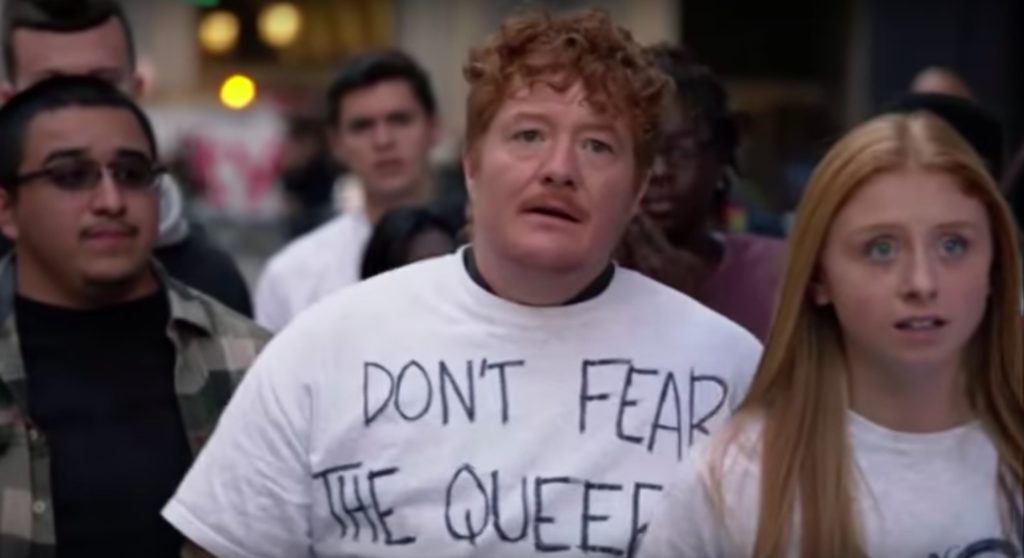Becca Blackwell performed their solo show, They, Themself and Schmerm, at New York City’s Joe’s Pub on Thursday, 22 February.
Described as ‘part classic stand-up comedy special, part teen zine vomit confessional,’ the show mixed anecdotes from Blackwell’s past—including difficult topics like molestation and death—with humor that could only come from someone whose life was spent hopping around the gender spectrum.
[embedded content]
GSN spoke with Blackwell about the show, their cameo appearance on Showtime favorite Shameless, and what it’s like existing somewhere in the middle of the gender binary.
The Show
The inspiration for They, Themself and Schmerm came after Blackwell saw Corey Haim’s 1989 video diary, Me, Myself and I.
[embedded content]
Blackwell struggled with the idea of performing solo, but luckily had friends that held them accountable for writing the show. Though they thought this show would be a one-shot deal, it really resonated with people. Thus, the show has had multiple runs in various iterations. Blackwell says the show is about 90% the same each time, and 10% new and different.
Though Blackwell is a trans non-binary person, they take issue with many aspects of PC culture. This is addressed at various points of the show, like when Blackwell takes a second to explain that they will say ‘men’ and ‘women,’ but obviously don’t mean just men and women.
‘The people who are the PC Police are the ones moaning about how the system doesn’t cater to them,’ Blackwell says. ‘When people find these things to get riled up about it’s a way of deflecting anxiety.’
It’s this self-righteousness that annoys Blackwell.
‘You can’t make the world this place where you’re safe,’ they say.
‘I’m not a PC person. I don’t like rules—rules are meant to be broken.’
And indeed, by existing as a ‘schmerm,’ they do break many preconceived rules about gender.
On compassion and opening up
Yet, this annoyance of PC culture isn’t to say that Blackwell can’t be a compassionate person. In fact, it’s quite the contrary.
‘The only way this show works for me is by doing intense meditation to open my heart up,’ they say.
Blackwell loves humanity and believes there’s a ‘connected consciousness’ in all of us—and it’s often brought out by laughter.
‘When you make people laugh, their hearts open up. They can be more present and receptive,’ Blackwell explains.
Blackwell’s show—which bounces around between toilet humor and emotional, personal monologues—makes the audience feel a whirlwind of different emotions. They describe it as ‘the stuff we all feel but no one wants to explore.’
For instance, at one point in the show, Blackwell talks about ‘man babies’—the men too shielded by toxic masculinity to express any vulnerability. They then go into the audience and, with full consent, sits on the lap of one such ‘man baby.’ For a good few minutes, Blackwell sits in silence on this man’s lap, staring into his eyes. The segment ends with a big hug. As Blackwell demonstrates, these ‘man babies’ just need affection.
Shameless
Blackwell has been performing for 25 years, but has really only been accepted the last four or five, when trans and non-binary people started to be in the mainstream spotlight. They recall not even being able to find an agent in the 90s in New York.
Yet, last year, thanks to a friend who is a writer for Showtime’s Shameless, Blackwell was able to land their first TV appearance.
Blackwell on the season 8 finale of Shameless
Blackwell had to wear their own clothes in the show, as none of the binary clothes the costume department had fit them.
‘I have a man-woman body,’ they explain.
They had a great time on the show, of which they appeared in three episodes of. They say everyone was really nice, especially William H. Macy, who plays the alcoholic father Frank Gallagher on the show.
Blackwell recalls Macy approaching everyone and introducing himself. They describe Macy’s personality as that of a ‘hippie stoner guy.’
This experience taught Blackwell that celebrities just like it when you treat them like normal people, and talk to them as such.
‘They’re just people,’ Blackwell says. ‘They pee and poop.’
Femininity is important, too
In terms of what Blackwell wishes the larger LGBTI community would understand, it’s that we can’t ridicule femininity in order to uphold structures of masculinity.
‘The currency of the gay culture has mostly been cock,’ they say.
Though gay men still have male privilege, there is often a stigma that surrounds homosexuality. And in different places, LGBTI culture can be dissimilar.
For instance, Blackwell believes that New York City has a more nuanced queer culture than elsewhere in the country. And in those other places, Blackwell says they need to ‘reverie femininity more.’
‘I don’t believe we’ll ever have equality until we see women and femininity as equally powerful and valuable as masculinity,’ they say.
And coming from someone who has existed at various places on the gender binary, they’re probably right.






